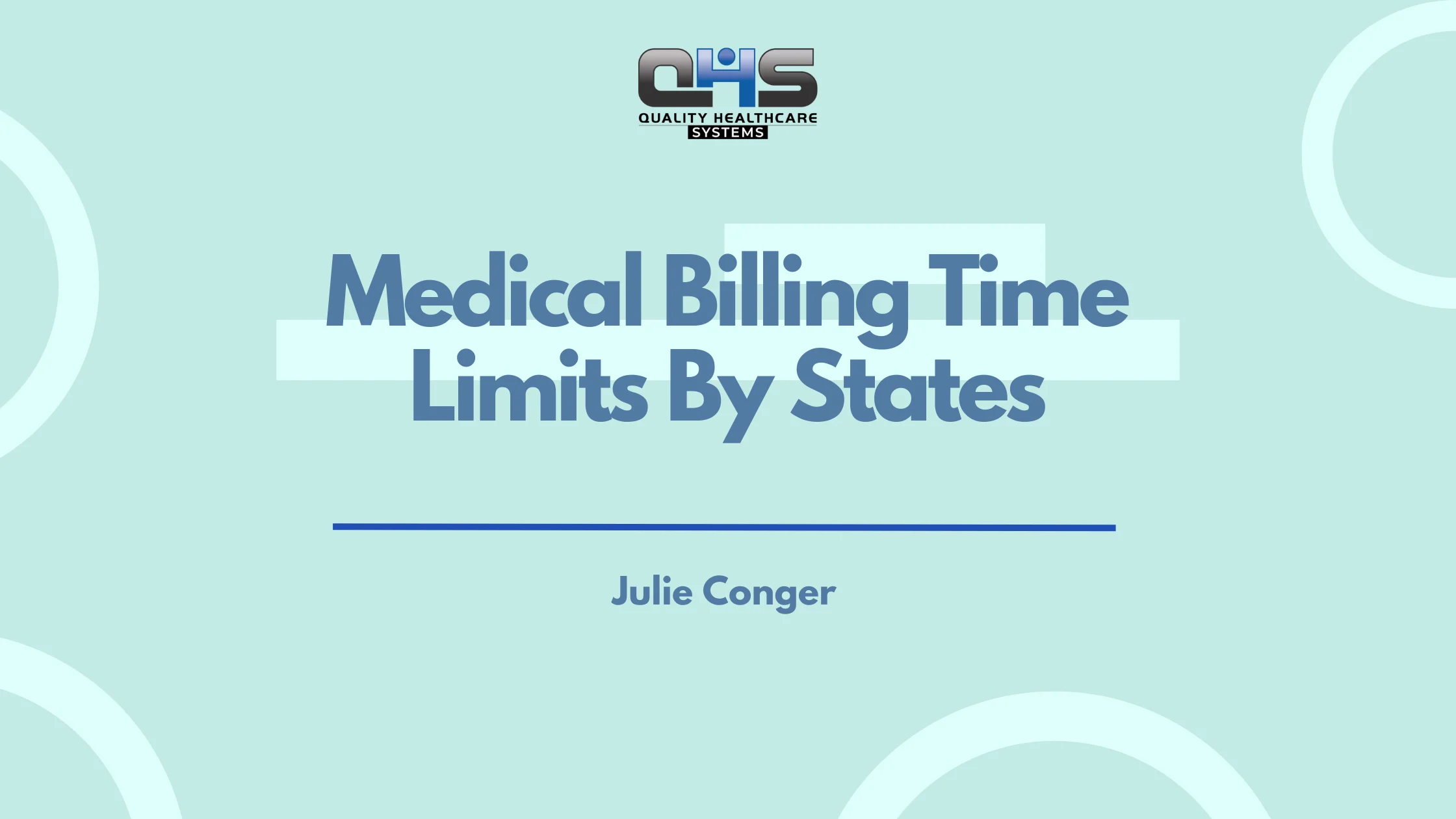Did you know medical bills can still arrive months or even years after treatment? Each state sets its own deadlines for how long providers can bill patients and insurers. Missing these deadlines can lead to denied claims or unexpected out-of-pocket costs.
This guide breaks down medical billing time limits by states, so you know your rights and avoid surprise bills.
What are Medical Billing Time Limits?
Medical Billing Time Limits refer to the deadlines within which healthcare providers must submit claims to insurance companies and bill patients for services. These limits vary by state and insurance policies, typically ranging from 30 days to 1 year for insurance claims and several years for patient billing based on state laws.
What Are Medical Billing Time Limits by State?
Since these time limits are not uniform nationwide, each state and insurance provider sets its own deadlines for claim submissions. Depending on the jurisdiction and policy, the timeframe can be as short as 30 days or extend up to a year.
In the following sections, we will explore the medical billing time limit laws of each state, providing detailed insights to help healthcare providers navigate this complex landscape effectively.
California Medical Timely Billing Law
California mandates that healthcare providers submit their claims to insurers within one year from the date the service was rendered. This rule ensures that providers manage their billing processes efficiently and helps maintain a streamlined financial operation within healthcare practices. It’s crucial for providers to stay informed and comply with these regulations to avoid potential denials for late submissions.
What are California’s Medical Billing Time Limits?
How long do providers in California have to submit medical bills? The state allows a period of up to one year from the date of service for providers to submit their claims to insurers. This time frame is designed to facilitate timely processing and reimbursement, crucial for the financial health of medical practices and uninterrupted healthcare services
Texas Medical Timely Billing Law
In Texas, healthcare providers must submit their claims within 95 days from the service date if they are under a preferred provider benefit plan. This tight deadline highlights the importance of robust billing operations and adherence to timelines to prevent claim denials and support financial stability in healthcare
What are Texas’s Medical Billing Time Limits?
In Texas, what is the deadline for submitting medical bills? Providers must ensure that claims are submitted within 95 days for patients under preferred provider plans. Meeting this deadline is essential for the effective management of reimbursements and avoiding financial discrepancies that can arise from delayed billing.
New York Medical Timely Billing Law
In New York, healthcare providers need to submit medical billing claims within 90 days when dealing with state-regulated insurance plans. This regulation is designed to ensure swift processing and prevent the backlog of unprocessed claims, thereby aiding both healthcare providers and patients in maintaining clearer financial records and responsibilities.
What are New York’s Medical Billing Time Limits?
What is the time frame for submitting medical billing claims in New York? Providers are required to submit their claims within 90 days to state-regulated plans, ensuring timely reimbursements and financial stability for healthcare practices
Florida Medical Timely Billing Law
Florida’s medical billing regulations require that providers submit their bills within 30 days of treatment. The state imposes strict deadlines to ensure that claims are processed quickly and efficiently, which helps in reducing the financial strain on both healthcare systems and patients
What are Florida’s Medical Billing Time Limits?
How quickly must medical bills be submitted in Florida? Providers have a 30-day window from the date of treatment to submit their claims, underlining the importance of efficient billing practices and prompt submissions
Rhode Island Medical Timely Billing Law
Healthcare providers in Rhode Island must submit claims to private insurance within a range that spans from 120 days up to one year. Medicaid claims must be submitted within 12 months from the date of service. This timeframe ensures providers manage their billing processes efficiently to maintain financial stability.
What are Rhode Island’s Medical Billing Time Limits?
In Rhode Island, how soon must medical bills be submitted? Providers should submit private insurance claims between 120 days and one year and Medicaid claims within 12 months to ensure timely reimbursement and avoid financial disruptions.
South Carolina Medical Timely Billing Law
In South Carolina, the timely submission of medical claims to private insurers must occur within 180 days to one year after the service date. Medicaid providers have a 12-month period to file their claims, promoting prompt and efficient billing practices essential for operational success.
What are South Carolina’s Medical Billing Time Limits?
What is the deadline for submitting medical claims in South Carolina? Providers must submit claims to private insurers within 180 days to one year and Medicaid claims within 12 months, highlighting the importance of adhering to these periods to optimize financial health.
South Dakota Medical Timely Billing Law
South Dakota requires healthcare providers to submit claims to private insurers anywhere from 180 days to one year after providing services. Similarly, Medicaid claims must be submitted within a 12-month window, supporting timely reimbursements and financial efficacy.
What are South Dakota’s Medical Billing Time Limits?
How long do providers in South Dakota have to file medical claims? The state mandates that claims to private insurers be submitted within 180 days to one year, and Medicaid claims within 12 months, ensuring efficient billing operations and financial stability.
Indiana Medical Timely Billing Law
In Indiana, healthcare providers are required to submit their medical claims within 90 days of the service date. This rule is designed to ensure efficient claim processing and timely reimbursements, reducing administrative burdens on both providers and insurers. The state’s regulations are structured to streamline operations and mitigate fraudulent claims by allowing prompt verification of services and accuracy of information.
What are Indiana’s Medical Billing Time Limits?
How long do providers in Indiana have to file medical bills? They must submit their claims within a 90-day period to meet the timely filing requirement, crucial for successful claim processing and maintaining financial health within medical practices.
This timeframe strikes a balance between administrative feasibility and the need for prompt submission, ensuring that the healthcare system operates smoothly and efficiently.
Illinois Medical Timely Billing Law
In Illinois, healthcare providers must submit their claims within 180 days from the discharge date. This period ensures that providers manage their billing processes efficiently to prevent delays in reimbursement. Specific criteria allow for extended submission timelines such as the inclusion of a HFS 1624A override request form for paper claims, demonstrating the state’s flexibility in accommodating various billing scenarios.
What are Illinois’s Medical Billing Time Limits?
What is the timeline for submitting medical claims in Illinois? Providers need to submit claims within 180 days from the discharge date. This timeframe helps streamline the reimbursement process and ensures that healthcare providers receive timely payments for their services, maintaining operational stability.
Virginia Medical Timely Billing Law
In Virginia, healthcare providers must navigate through the statutes that set the billing timelines. The medical billing regulations in Virginia are aligned with the state’s statute for written contracts, set at 3 years.
This period allows healthcare providers ample time to manage their billing and ensures that they can seek legal action to collect unpaid medical debts within this timeframe, facilitating fair practices and financial consistency.
What are Virginia’s Medical Billing Time Limits?
How long do providers in Virginia have to submit medical bills? The state allows a 3-year period from the date of service for providers to submit claims. This extended timeframe is crucial for providers to ensure all services are billed correctly and to secure their financial interests effectively.
Why Are Medical Billing Time Limits Important?
Medical Billing Time Limits ensure providers submit claims and bill patients within legal deadlines. Missing these limits can lead to denied claims, lost revenue, and unexpected patient bills.
Why Medical Billing Time Limits Matter:
Medical billing time limits matters because it plays an important role in healthcare finance, ensuring claims are processed on time, patients receive accurate bills, and providers comply with legal requirements.
- Prevents Claim Denials: Insurance companies reject late claims, leading to unpaid services.
- Ensures Timely Patient Billing: Patients receive bills within a set timeframe, reducing disputes.
- Regulatory Compliance: Providers must follow state laws and insurer deadlines to avoid penalties.
- Improves Revenue Cycle Management: Faster claim submissions maintain steady cash flow.
- Reduces Legal and Financial Risks: Clear deadlines prevent billing conflicts and legal action.
What Are the Consequences of Missing Medical Billing Time Limits?
Missing medical billing deadlines can significantly impact healthcare providers:
- Revenue Loss: Late claim submissions often result in denials, leading to direct financial losses.
- Increased Administrative Burden: Addressing denied claims requires additional administrative efforts, diverting resources from patient care.
- Patient Trust Erosion: Delayed or incorrect billing can lead to patient dissatisfaction, affecting trust and potentially leading to loss of clientele.
How Can Healthcare Providers Ensure Compliance with State Time Limits?
To mitigate these risks, healthcare providers can implement the following strategies:
- Automate Billing Processes: Utilize advanced billing software to automate claim submissions, reducing the likelihood of human error and ensuring timely submissions.
- Develop a Compliance Calendar: Create a detailed calendar outlining submission deadlines for various payers and states, ensuring all team members are aware of critical dates.
- Engage in Continuous Education: Regularly update billing staff on changing regulations and payer requirements to maintain compliance.
- Establish a Denial Management Team: Form a dedicated team to analyze denied claims, identify patterns, and implement corrective actions to prevent future occurrences.
- Foster Clear Communication with Patients: Educate patients about their billing responsibilities and any potential costs upfront to prevent confusion and delays in payments.
What is the Statute of Limitations on Medical Bills?
The statute of limitations on medical bills is the legally defined period within which a healthcare provider or collection agency can file a lawsuit to recover unpaid medical debt. This timeframe varies by state and typically ranges from 3 to 6 years, depending on the type of debt and local laws.
Medical Billing Time Limits vs. Statute of Limitations on Medical Bills
| Aspect | Medical Billing Time Limits | Statute of Limitations on Medical Bills |
| Definition | Deadline for providers to submit claims to insurance or bill patients. | Legal timeframe to sue for unpaid medical debt. |
| Purpose | Ensures timely claim processing and billing. | Limits how long a provider or collector can sue. |
| Who It Applies To | Healthcare providers, insurers, and patients. | Patients and collection agencies. |
| Typical Timeframe | 30 days to 1 year for insurance claims; varies for patient billing. | 3 to 6 years, depending on state laws. |
| Consequences of Missing | Claim denial, loss of payment, or delayed billing. | Inability to take legal action for unpaid debt. |
| Varies by State? | Yes, based on state laws and insurance policies. | Yes, based on state statutes. |
Understanding the Time Limit for Medical Billing Claims: A Comprehensive Guide
Timely filing is a critical aspect of the medical billing process, with significant implications for both healthcare providers and patients. Missing the deadline to submit a claim can result in revenue loss, denied reimbursements, and increased administrative overhead. This guide explains the importance of timely filing, the variations across insurance providers, and how to manage denials and appeals effectively.
What Are Medical Billing Time Limits and Why Do They Matter?
Medical billing time limits, often referred to as “timely filing limits,” are the maximum timeframes within which a healthcare provider must submit a claim to an insurance company after providing services to a patient. These limits vary by payer but typically range from 90 days to 12 months from the date of service (DOS).
Failing to submit a claim within the allowed time window often results in a denied claim. In such cases, the financial responsibility does not usually transfer to the patient, meaning the provider may have to write off the charges. Understanding and managing these deadlines is essential to ensure uninterrupted revenue flow and compliance with payer guidelines.
How Do Timely Filing Limits Vary by Payer?
Different insurance payers, including commercial insurers, Medicare, Medicaid, and TRICARE, have specific timely filing rules:
- Medicare: Claims must be submitted within 12 months from the date of service.
- Medicaid: Varies by state; some require claims within 90 to 180 days.
- Commercial insurers (e.g., Aetna, Cigna, UnitedHealthcare): Filing limits can range from 90 days to 6 months, depending on the contract.
Providers must maintain up-to-date documentation on payer-specific rules and ensure billing systems are configured to flag deadlines well in advance.
What Happens When a Claim Is Denied Due to Timely Filing?
When a claim is submitted after the filing deadline, the payer may issue a timely filing denial. The provider then loses the ability to collect reimbursement for services rendered. In such cases:
- The patient is not usually liable for the unpaid bill.
- The provider may need to write off the amount as an administrative loss.
- Frequent denials can lead to audits and negative revenue cycle metrics.
Proper documentation and timely claim submission practices can significantly reduce the risk of such denials.
Can Timely Filing Denials Be Appealed?
Yes. If a provider believes a claim was denied incorrectly for timely filing, there is a formal appeals process:
- Review internal records: Confirm the date of service and the actual claim submission date.
- Collect proof of submission: This may include EDI transmission reports, acknowledgment receipts, or payer correspondence.
- Draft a written appeal: Clearly explain the situation, attach supporting documents, and reference any state regulations or payer guidelines.
- Submit the appeal within the payer’s specified window (often within 30–60 days of denial).
Appeals are more likely to succeed if the provider can demonstrate that the delay was caused by payer system errors, electronic submission failures, or natural disasters.
What Impact Does the No Surprises Act Have on Medical Billing Timeframes?
The No Surprises Act (NSA), which took effect in 2022, directly affects how out-of-network emergency and certain non-emergency claims are handled. Under NSA:
- Providers must bill patients only the in-network cost-sharing amount for covered services.
- Insurers must pay providers within 30 days of receiving the clean claim.
- Providers have an additional 30 days to initiate a payment dispute if the insurer’s payment is unsatisfactory.
The NSA introduces tighter billing timelines, especially for emergency care, which means providers must act quickly to ensure compliance and avoid revenue loss.
What Are Best Practices for Avoiding Late Claim Submissions?
To reduce the risk of missing timely filing deadlines, medical practices should implement the following strategies:
- Automate claim submission: Use EHR and RCM systems with automated billing workflows.
- Track deadlines by payer: Maintain a current database of payer-specific timely filing rules.
- Train staff regularly: Ensure billing teams are well-versed in updates to insurance policies and regulations.
- Conduct internal audits: Periodically review denied claims for trends and opportunities to improve.
- Maintain submission documentation: Store EDI logs, confirmation receipts, and correspondence securely for future reference.
These measures can drastically lower the rate of denials and improve first-pass claim acceptance.
How Should You Handle Late Patient Payments After Timely Claims?
While insurers have timely filing requirements, patients also have payment obligations once claims are processed. Late patient payments can hurt your cash flow. Here’s how to manage them:
- Set clear payment terms in the patient intake process.
- Send payment reminders via SMS, email, or calls.
- Apply late fees and interest where allowed by law.
- Escalate to collections only after exhausting communication options.
Ensure compliance with federal and state laws, including the Fair Debt Collection Practices Act (FDCPA), when dealing with delinquent patient accounts.
Conclusion
At Quality Healthcare Systems, we are delighted to guide you through the complexities of medical billing time limits across various states. Our expertise ensures that healthcare providers like you can navigate these regulations with confidence and ease. By partnering with us, you can focus on delivering exceptional patient care, knowing that your billing processes are in expert hands.
Frequently Asked Questions
How long does a hospital have to bill you?
A hospital typically has one year to bill you, but this varies by state and insurance contracts. Some states have shorter or longer statutes of limitations.
How long does a medical provider have to bill you?
Medical providers usually have 6 months to 1 year to bill you, depending on state laws and insurance agreements. However, private pay patients may receive bills even later.
How long does it take to get a hospital bill?
It can take 30 to 90 days to receive a hospital bill, depending on insurance processing and hospital billing cycles.
How long does a provider have to bill insurance?
Most insurance companies require claims to be submitted within 90 to 180 days of service, but deadlines can range from 30 days to 1 year, depending on the insurer and policy.
How long after service can a doctor bill you?
Doctors can bill you up to the state’s statute of limitations, typically 3 to 6 years, but this varies by state and contract terms with insurance providers.
What is the statute of limitations on medical bills?
The statute of limitations on medical bills is the legally defined period during which a creditor can sue to collect an unpaid medical debt. This period varies by state, typically ranging from three to ten years.
Is there a statute of limitations on medical bills?
Yes, there is a statute of limitations on medical bills, varying by state. For instance, in California, it is four years from the date of the bill.
What happens when the statute of limitations on a medical bill expires?
Once the statute of limitations expires, creditors cannot sue to collect the debt. However, the debt remains, and creditors may still attempt to collect it through other means.
How does the statute of limitations affect my credit report?
The statute of limitations pertains to the timeframe during which a creditor can sue for unpaid medical bills. Separately, medical debts can appear on your credit report for up to seven years, impacting your credit score regardless of the statute of limitations.
Can the statute of limitations on medical bills be reset?
Yes, making a partial payment or acknowledging the debt can reset the statute of limitations, giving creditors a new timeframe to sue for the debt.
How can I find out the statute of limitations for medical bills in my state?
Consult state laws or legal resources to determine the statute of limitations for medical bills in your state. For example, SoloSuit provides state-by-state information on medical debt statutes of limitations.
What should I do if a creditor sues me after the statute of limitations has expired?
If sued after the statute of limitations has expired, you can use the expired statute as a defense in court. It’s crucial to respond to the lawsuit and inform the court that the debt is time-barred.
Are there any recent changes to how medical debts are reported on credit reports?
Yes, the Consumer Financial Protection Bureau (CFPB) finalized a rule banning the inclusion of medical bills on credit reports used by lenders and prohibiting lenders from using medical information in lending decisions.
Does the statute of limitations apply to all types of medical debts?
Yes, the statute of limitations generally applies to all types of medical debts, though specific circumstances and state laws can influence the applicable timeframe.
Can a medical debt still affect me after the statute of limitations has expired?
Yes, even after the statute of limitations has expired, the debt remains, and creditors may continue collection efforts, excluding legal action. Additionally, the debt can still appear on your credit report for up to seven years, impacting your credit score.






